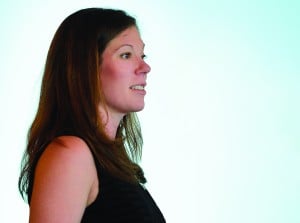 As a biomedical doctoral student, Sarah Hemminger ’02, PhD ’10, had driven past the intersection of Caroline and Orleans streets hundreds of times on her way to Johns Hopkins’ East Baltimore medical campus. But while she was idling at a traffic light one early weekday morning in 2004, the surrounding scene suddenly flipped into new focus.
As a biomedical doctoral student, Sarah Hemminger ’02, PhD ’10, had driven past the intersection of Caroline and Orleans streets hundreds of times on her way to Johns Hopkins’ East Baltimore medical campus. But while she was idling at a traffic light one early weekday morning in 2004, the surrounding scene suddenly flipped into new focus.
She saw not just a group of students milling around outside Dunbar High School, but an opportunity to reach out and connect with people in her community in a way that would be deeply meaningful for her and for them.
“I knew that many of those young people faced the same issues that my husband, Ryan, encountered in high school in Indianapolis: poverty and a lack of a safety net of any kind,” Hemminger says. “He was floundering until an absolutely amazing group of teachers came through for him, supporting him with rides to school, tutoring, food, and all the other things that he needed to be successful. I also realized that those students and I had something in common: We all were, in some way, isolated. I thought that if we could reach out to those students, both they and I would benefit from the sense of connection, and wonderful things could happen for everyone.”
Little more than a decade later, Hemminger is CEO and founder of Thread, a nonprofit that has become a nationally recognized model for helping underperforming high school students achieve their potential academically and socially. Thread (originally called the Incentive Mentoring Program) does this by wrapping the students in a strong, new social fabric woven from university- and community-based volunteers, who “do whatever it takes to help them be successful,” according to Hemminger.
“Basically, what we do is provide whatever these students need, from going to their homes to make sure they go to school, to packing their lunches, to tutoring them and connecting them with community resources,” says Hemminger, who from time to time has opened her own home to Thread students.
The results are impressive. In its decade of existence, Thread has grown from two volunteers (Hemminger and her husband, Ryan) to a paid staff of 10 along with 700 volunteers, who currently are working with 159 students and their families. Since Thread’s inception, 100 percent of students have not only remained enrolled in the program but have graduated from high school. Ninety-six percent have been accepted to college.
“I hope we have redefined what we mean by the word ‘family,’” says Hemminger,
who was honored as an Ashoka Fellow in 2012, was one of Glamour’s “20 Amazing Young Women” in 2010, and was named an Open Society Institute and Echoing Green fellow in 2009.
“To me, family is what happens when you intentionally bring people together to provide everyone with support and a feeling of belonging,” she says. “In the case of Thread, everyone involved benefits because everyone has something to offer and something to learn.”




